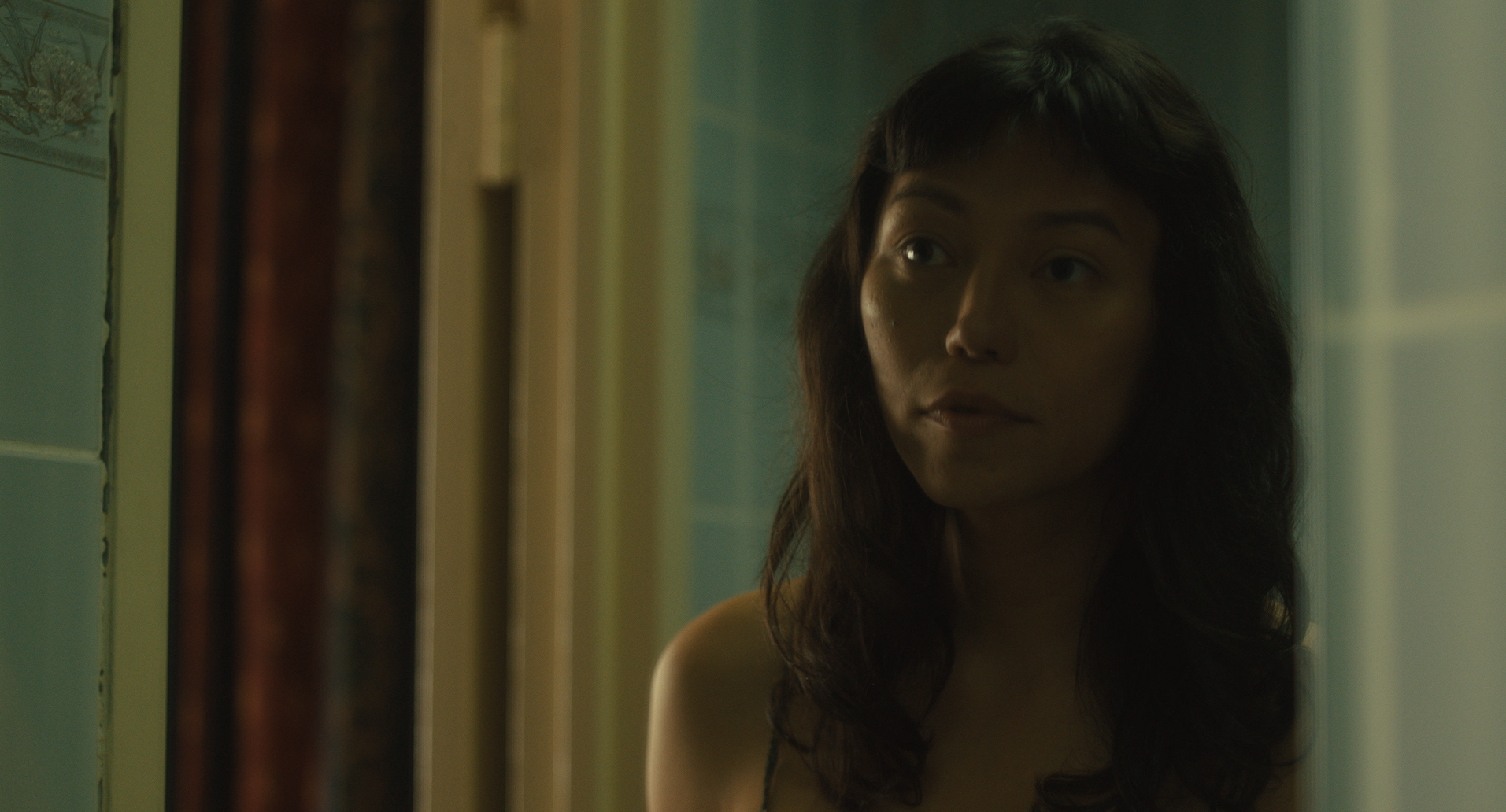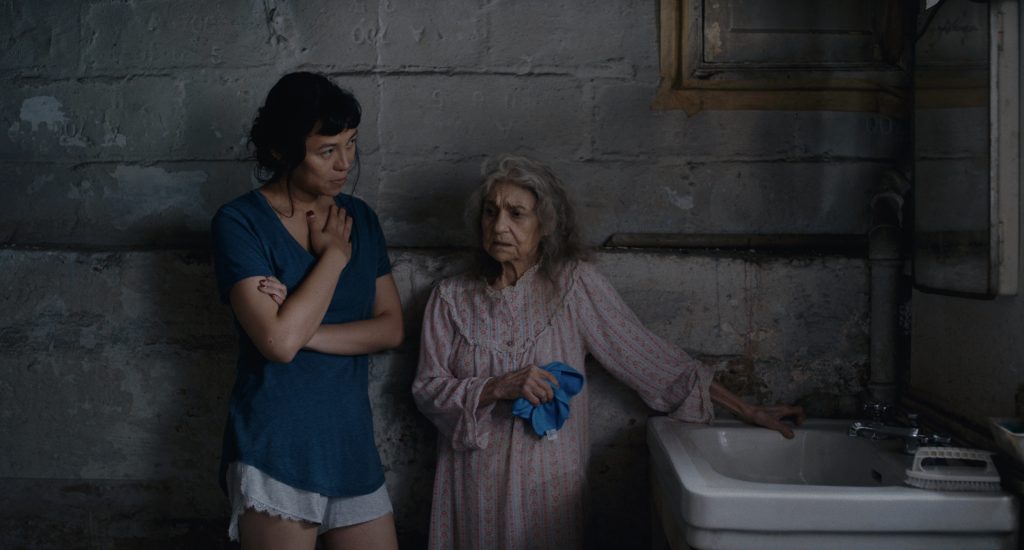
Isabel Sandoval spoke with Solzy at the Movies over the phone about her new film, Lingua Franca, being released on Netflix by Array Releasing. The film opens in select theaters and Netflix on August 26, 2020.
Lingua Franca is getting released on Netflix this month after a festival run that started last year in Venice. How does it feel to be able to end the festival run on a high note by taking home the jury prize at Bentonville?
Isabel Sandoval: It’s been such a surreal adventure and also a vindicating feeling because Lingua Franca, I think, is a kind of risky proposition for a feature film. It was clearly made outside of the Hollywood studio system. I’m proud of this film with what I like to think a very singular, maybe even divisive voice, is being well received especially internationally after it premiered in Venice. It actually opened in France over a month ago to enthusiastic reviews. I’m really proud of this film and what it’s done so far.
You made history at Venice last year by becoming the first transgender filmmaker to direct a film in competition. Do you recall how you felt upon hearing your film was selected?
Isabel Sandoval: It took a few days for the news to sync in. It’s just a phenomenal, exhilarating feeling, especially in a race for that space. They reviewed 1000 submissions and ultimately just chose 11 feature films. It was really a special feeling but I was also quite apprehensive about traveling outside the US for the first time in a few years. Like Olivia, I’m fortunate that I have papers. But ever since Trump got elected, I haven’t really ventured outside of US because of the situation when you’re both an immigrant and a transgender person. When I left the US for the first time to go to Italy for the festival, I was very anxious especially flying back home to JFK. I was really worried that I would not be able to get in nor would I be sat down and they’d be asking me, so what were you traveling to Italy for? Well, I made a movie about an undocumented trans woman. Venice was nothing but amazing.
What has the audience reception been during film festival screenings?
Isabel Sandoval: It’s been divisive because it touches on subject matters like immigration and the transgender experiences occasionally in the US by passing traffic in easy, obvious, and straightforward emotions. The emotions that I deal with in the film are subtle, complex, and different and sometimes even illusions. That might be difficult for certain audiences to rally behind. I think what I wanted to do in the film that accomplished—it’s an invitation for people to look at a character like Olivia more deeply and more critically—especially when it comes to her decision at the end of the film that may seem counter intuitive and impractical for people who just see her as an immigrant without papers, who turned down an offer to make her life easier. I think that makes them realize that she’s more than just a label. This is a woman who ultimately wants to gain her agency back and their ability to determine for herself what’s going to happen to her life.
What was the most challenging part of the production?
Isabel Sandoval: In scenes when I’m acting with other actors who I don’t think is nailing the nuance or the emotion that I want them to play in that specific scene, it t becomes logistically challenging having to go back and watch this again in the monitor and do another take. And then because this is an independent film, we shot the film in 16-17 days. As a filmmaker who also is a producer in this film, I’m very conscious of things. Actually, the logistics are complicated in pulling off for a film like this. In terms of wearing multiple hats (writing, directing, editing, producing, actingin the film), it wasn’t as challenging for me because I didn’t necessarily think of them as separate jobs for different roles in the film. I had one job, which is to tell a story and to make a film. The script was one aspect of that and the direction of another aspect. I feel that because I had a very clear vision of what I want accomplish in the film, putting on those multiple hats just made it easier for me as an auteur to make the film that I wanted to make.
What were you looking for in terms of the film’s look?
Isabel Sandoval: I think there’s something very intriguing in a film that has an addition between placid sphere surface and roiling emotional or transcending.. I see that in the films of the Christian Petzold like Transit and before that, Phoenix, both of which were set during the Second World War. Also, the films of Wong Kar-Wai like In the Mood for Love and James Gray, who (inaudible) by and huge were very much influences in the visual feel of the film. As a matter of fact, the work of James Gray has often been a dramatic influence in my work, especially Two Lovers. That’s part of the reason why I decided to set Lingua Franca in Brighton Beach.

Can you talk about working with the late Lynn Cohen and what she brought to the film with her performance?
Isabel Sandoval: Lynn was a legend and I’m very, very lucky to have worked with her before she passed away earlier this year. I think it’s her quiet wordless moments in the film that are the most poignant, emotional, and most compelling. She’s been a champion of the film since day one when she read the script. She accepted the offer to play Olga right away. Her parents were also immigrants from Ukraine and she told me the story of Lingua Franca is something that needs to be told and made especially in the political climate. I’ve just been very lucky to work with her. I think she brings real gravitas to the film.
What does it mean to you to have Ava DuVernay’s ARRAY Releasing pick up the film for distribution?
Isabel Sandoval: I’m very honored and thrilled to be working with Ava because we already know that Ava and her distribution company are champions and amplifies voices of underrepresented filmmakers like women filmmakers, persons of color, immigrant filmmakers. I also very much appreciate Ava wanting this to be about my film as an auteur—as someone with a unique, distinctive, singular voice. It’s easy to check engagement. I think it’s very tempting especially in the current cultural and political moment to engage with the film purely on its themes and the social issues that it touches on. I would also like people to see that I am an auteur or an artist with a distinctive voice. I am very glad that Ava also wanted me to talk about that and embrace that about this film.
How has the pandemic affected your work as a filmmaker—is it easier or harder to be creative?
Isabel Sandoval: I’m an introvert, which you could probably tell from the movie. I actually left New York back in early June so I’m somewhere in the south. I’m appreciating the peace and quiet to be creative. Of course, everyone around the world suffering through the pandemic and have been subject to dealing with it mentally and emotionally. On a personal level, I think it’s allowed my art to flourish and that it’s given me the space and the solitude to be inspired and create. I actually finished a script for my next feature film during the pandemic.



